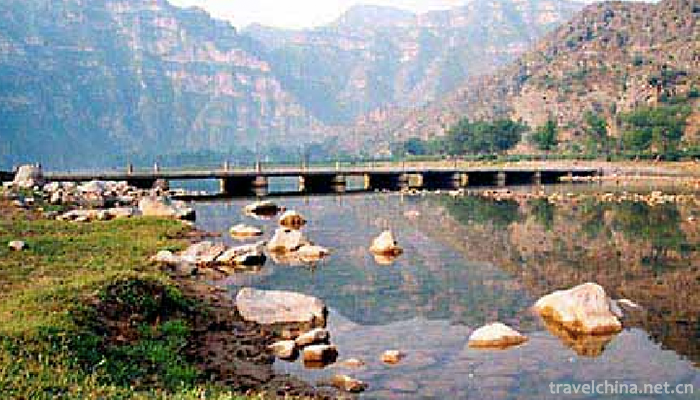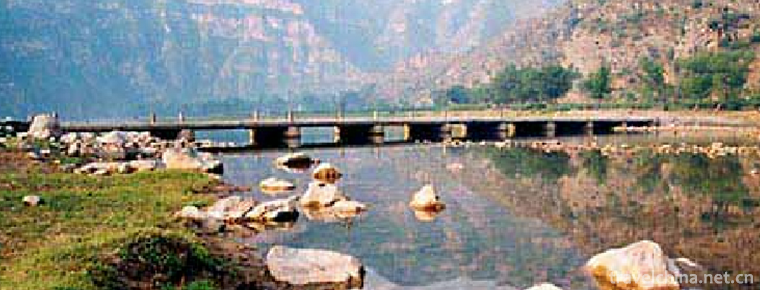Legend of Yongding River
Legend of Yongding River
Yongding River legend is one of the local folklores in Beijing. Among many legends, the legend of river blocking is representative; the legend of Shijing Mountain and Shijing Mountain; the legend of buffalo in Yongding River Town; the legend of Wang Laohan planting river banks and willows; the legend of General Feng severely punishing veterans and ruffians; the legend of Mayu Village; and the Legend of Liu Niangfu.
In 2008, the legend of Yongding River declared by Shijingshan District of Beijing was listed in the second batch of national intangible cultural heritage list with the approval of the State Council.
Historical Origin
Yongding River is the largest river in Beijing. It originates from Guanjunling in Ningwu County, northern Shanxi Province. It runs through Mentougou, Shijingshan, Fengtai, Fangshan and Daxing five districts. The total length of Yongding River is 650 kilometers. The total area of the river basin is 50800 square kilometers. It is called "Mother River of Beijing". The inland reach of Shijingshan District is about 11.6 kilometers long, 100-1500 meters wide, Sandy and pebble riverbed, with a maximum water level of 7 meters and a basin area of 80 square kilometers. Because of the topographic reasons, the Yongding River Basin often suffers from continuous floods, which poses a great threat to the urban and rural areas of Beijing. In order to avoid disaster and live a stable life, people have produced many legends about Yongding River.
The location of Beijing City was formed and developed on the upper part of the flood alluvial fan of Yongding River. In the early years, the timber needed for the construction of Beijing was transported to Beijing by Yongding River. This long-standing river not only gave birth to the ancient city of Beijing, but also gave birth to the Yongding River culture, which runs through the historical development and accumulates profound details. The legend of Yongding River is one of its unique contents.
primary coverage
Among many legends, the most representative ones are: legends of river blocking; legends of stone and damp rivers; legends of buffalo in Yongding River Town; legends of planting river banks and willows by Wang Laohan; legends of General Feng's severe punishment of veterans and ruffians; legends from Mayu Village; legends of Liu Niangfu.
Inheritance value
The legend of Yongding River is vivid, rich in content and rich in local color. It is the crystallization of the wisdom of the people on both sides of Yongding River. It records the development history of people's harnessing Yongding River in different historical periods and provides detailed information for the study of the history of Beijing's production and development. At the same time, the people around Yongding River, as reflected in legend, have certain practical significance and educational value in their struggle and spirit to overcome floods and fight relentlessly with nature.
Current situation of inheritance
The legend of Yongding River has a long history. Cao Yuxing is the most representative narrator in Shijingshan. Because the old man is 95 years old and has a high age, if these oral legends are not recorded and sorted out, the legend of Yongding River, which has a long history, will probably disappear under the impact of modernization.


-
1.Beijing Hangzhou Grand Canal Museum
The Beijing-Hangzhou Grand Canal Museum of China is located on the south side of the Canal Cultural Plaza in Gongshu District, Hangzhou City, Zhejiang Province, adjacent to the Gongchen Bridge, the te
Time 2018-12-22 -
2.Size Dongtian Scenic Spot
The Size Dongtian Scenic Area (formerly known as the Haishan Scenic Spot and Aoshan Scenic Spot) is located in the southern corner of Hainan Province, 40 kilometers west of Sanya City
Time 2019-01-07 -
3.Duan Inkstone Production Techniques
Duan inkstone production technology, Zhaoqing City, Guangdong Province, traditional handicraft, one of the national intangible cultural heritage.
Time 2019-04-28 -
4.Heap harmonics
"Heap Harmony" first spread in the Yarlung Zangbo River Basin, the high terrain west of Shigaze to the whole area of Ali circle dance, and later gradually prevailed in Lhasa. It was the firs
Time 2019-04-28 -
5.Ha Ni Ha Ba
Ha Ni Ha Ba, an important part of Chinese Hani folk literature. Hani Haba, which means Hani ancient songs, is a popular and far-reaching folk song in Hani social life.
Time 2019-05-02 -
6.Gourd sculpture
There are two techniques for carving gourds. One is to use three kinds of special steel needles, large, medium and small, to carve the landscape, flowers and characters in the gourd
Time 2019-05-03 -
7.Jiangzi dama Festival
Dama Festival: It is a traditional Tibetan program with unique style in Jiangzi area of Tibet. It is said that the first Dama Festival is a horse race and archery competition held to celebrate the com
Time 2019-05-05 -
8.Qinghai Pingxian
Qinghai Pingxian, also known as Xining Fu Zi, is one of the new local folk songs in Qinghai Province. It is popular in Xining, Huangzhong, Datong and Mutual Aid Agricultural Areas. Qupai is known
Time 2019-06-10 -
9.Shouning North Road Drama
Shouning North Road Opera, commonly known as Fujian Random Bomb and Hengshao Opera, came into being after Random Bomb entered Fujian in the mid-Qing Dynasty, such opera troupes as road work, off-road
Time 2019-06-15 -
10.Yangzhou Tanci
Yangzhou's performance of ci-poems is mainly based on speech and supplemented by singing and playing. The representative bibliographies are "Double Gold Ingot", "Pearl Tower", &quo
Time 2019-07-10 -
11.Tiantai Mountain in Qionglai
Tiantai Mountain Scenic Area in Qionglai is located in the southwest of Qionglai City, the hometown of Wenjun. It is the habitat of Sichuan Giant Panda. It is 110 km away from Chengdu City and 45 km away from Qionglai.
Time 2020-11-05 -
12.Nanchong City honor
"Three products" strategy demonstration city of consumer goods industry, charming city with Chinese characteristics, national garden city and excellent tourism city in China
Time 2020-12-17